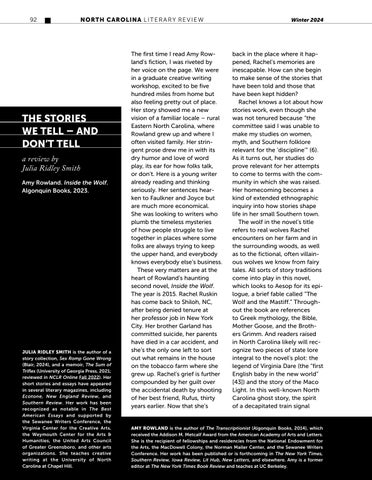92
NORTH CAROLINA L I T E R A R Y RE V I E W
THE STORIES WE TELL – AND DON’T TELL a review by Julia Ridley Smith Amy Rowland. Inside the Wolf. Algonquin Books, 2023.
JULIA RIDLEY SMITH is the author of a story collection, Sex Romp Gone Wrong (Blair, 2024), and a memoir, The Sum of Trifles (University of Georgia Press, 2021; reviewed in NCLR Online Fall 2022). Her short stories and essays have appeared in several literary magazines, including Ecotone, New England Review, and Southern Review. Her work has been recognized as notable in The Best American Essays and supported by the Sewanee Writers Conference, the Virginia Center for the Creative Arts, the Weymouth Center for the Arts & Humanities, the United Arts Council of Greater Greensboro, and other arts organizations. She teaches creative writing at the University of North Carolina at Chapel Hill.
The first time I read Amy Rowland’s fiction, I was riveted by her voice on the page. We were in a graduate creative writing workshop, excited to be five hundred miles from home but also feeling pretty out of place. Her story showed me a new vision of a familiar locale – rural Eastern North Carolina, where Rowland grew up and where I often visited family. Her stringent prose drew me in with its dry humor and love of word play, its ear for how folks talk, or don’t. Here is a young writer already reading and thinking seriously. Her sentences hearken to Faulkner and Joyce but are much more economical. She was looking to writers who plumb the timeless mysteries of how people struggle to live together in places where some folks are always trying to keep the upper hand, and everybody knows everybody else’s business. These very matters are at the heart of Rowland’s haunting second novel, Inside the Wolf. The year is 2015. Rachel Ruskin has come back to Shiloh, NC, after being denied tenure at her professor job in New York City. Her brother Garland has committed suicide, her parents have died in a car accident, and she’s the only one left to sort out what remains in the house on the tobacco farm where she grew up. Rachel’s grief is further compounded by her guilt over the accidental death by shooting of her best friend, Rufus, thirty years earlier. Now that she’s
Winter 2024
back in the place where it happened, Rachel’s memories are inescapable. How can she begin to make sense of the stories that have been told and those that have been kept hidden? Rachel knows a lot about how stories work, even though she was not tenured because “the committee said I was unable to make my studies on women, myth, and Southern folklore relevant for the ‘discipline’” (6). As it turns out, her studies do prove relevant for her attempts to come to terms with the community in which she was raised. Her homecoming becomes a kind of extended ethnographic inquiry into how stories shape life in her small Southern town. The wolf in the novel’s title refers to real wolves Rachel encounters on her farm and in the surrounding woods, as well as to the fictional, often villainous wolves we know from fairy tales. All sorts of story traditions come into play in this novel, which looks to Aesop for its epilogue, a brief fable called “The Wolf and the Mastiff.” Throughout the book are references to Greek mythology, the Bible, Mother Goose, and the Brothers Grimm. And readers raised in North Carolina likely will recognize two pieces of state lore integral to the novel’s plot: the legend of Virginia Dare (the “first English baby in the new world” [43]) and the story of the Maco Light. In this well-known North Carolina ghost story, the spirit of a decapitated train signal
AMY ROWLAND is the author of The Transcriptionist (Algonquin Books, 2014), which received the Addison M. Metcalf Award from the American Academy of Arts and Letters. She is the recipient of fellowships and residencies from the National Endowment for the Arts, the MacDowell Colony, the Norman Mailer Center, and the Sewanee Writers Conference. Her work has been published or is forthcoming in The New York Times, Southern Review, Iowa Review, Lit Hub, New Letters, and elsewhere. Amy is a former editor at The New York Times Book Review and teaches at UC Berkeley.
